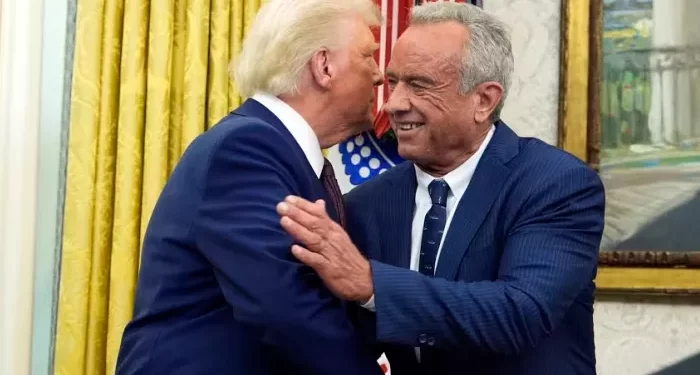U.S. Health Secretary Robert F. Kennedy Jr. unveiled a significant restructuring plan on Thursday, March 26, that will eliminate 10,000 jobs within the Department of Health and Human Services (HHS) as part of his broader “Make America Healthy Again” initiative. This plan aims to shift focus toward chronic disease prevention, though it has already sparked concern among health experts.
The restructuring, which is expected to reduce the HHS workforce from 82,000 to 62,000, includes a combination of job cuts, early retirements, and buyouts. The changes are set to save the department an estimated $1.8 billion annually—equivalent to just 0.1 percent of HHS’s $1.8 trillion annual budget.
“We aren’t just reducing bureaucratic sprawl,” Kennedy stated. “We are realigning the organization with its core mission and our new priorities in reversing the chronic disease epidemic.” The reorganization will consolidate HHS’s 28 divisions into 15, creating a new entity called the Administration for a Healthy America (AHA), which Kennedy claims will operate more efficiently, delivering better results at a lower cost to taxpayers.
Health Experts Voice Concerns Amid Restructuring
This move comes at a time when the U.S. is grappling with the worst measles outbreak in years, which has sickened 378 people—most of whom were unvaccinated—and led to two deaths. The outbreak highlights the tension between Kennedy’s stance on public health and the concerns of experts regarding vaccine safety. Kennedy, who has previously downplayed the importance of vaccines, continues to advocate for alternative treatments, such as Vitamin A for measles, instead of the routine vaccination.
His rhetoric has drawn significant criticism from health professionals. For instance, Kennedy has publicly questioned the role of vaccines in controlling infectious diseases, including expressing doubt about the scientific consensus on HIV and AIDS. He has also suggested that avian influenza should be allowed to spread in poultry populations, claiming that the birds which survive may possess genetic immunity and could be selectively bred. Experts have warned that this approach could accelerate dangerous viral mutations and increase the risk of a human pandemic.
Kennedy’s leadership has raised alarm for those who fear that his history of promoting misinformation could undermine critical public health efforts. In 2023, Kennedy proposed a pause on infectious disease research for eight years, a suggestion that was widely dismissed by the scientific community.
Impact on Key Health Agencies
The restructuring will hit some of the nation’s key health agencies the hardest. The Food and Drug Administration (FDA) will see the largest cuts, losing 3,500 positions, followed by the Centers for Disease Control and Prevention (CDC) with 2,400 job cuts, and the National Institutes of Health (NIH), which will lose 1,200 employees. The plan also aims to shift the department’s focus toward tackling chronic illnesses through measures such as promoting safe food, clean water, and the elimination of environmental toxins.
Despite Kennedy’s emphasis on improving environmental standards and food safety—issues that resonate with many in the health community—his history of spreading misinformation and his controversial views on vaccines and public health continue to cast doubt on his ability to lead the department in an evidence-based manner.
Pediatrician and vaccine expert Paul Offit sharply criticized Kennedy’s approach, stating, “He couldn’t do a worse job than he’s doing.”
As the country grapples with ongoing public health challenges, the future of Kennedy’s ambitious restructuring plan remains uncertain, with many questioning its potential to improve the health landscape amid ongoing concerns about its underlying motivations and approach.
Related topics



























